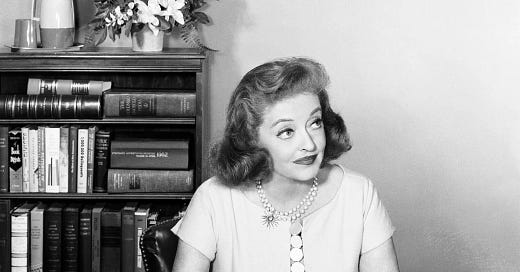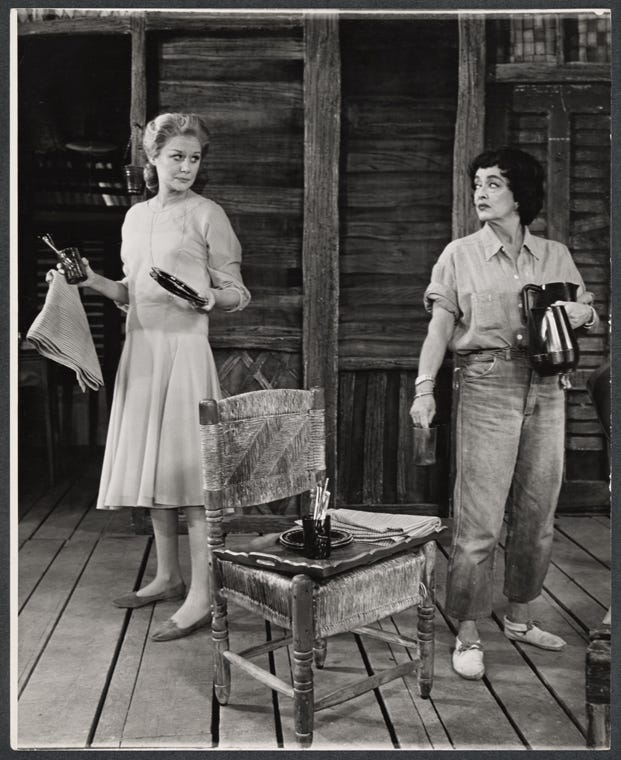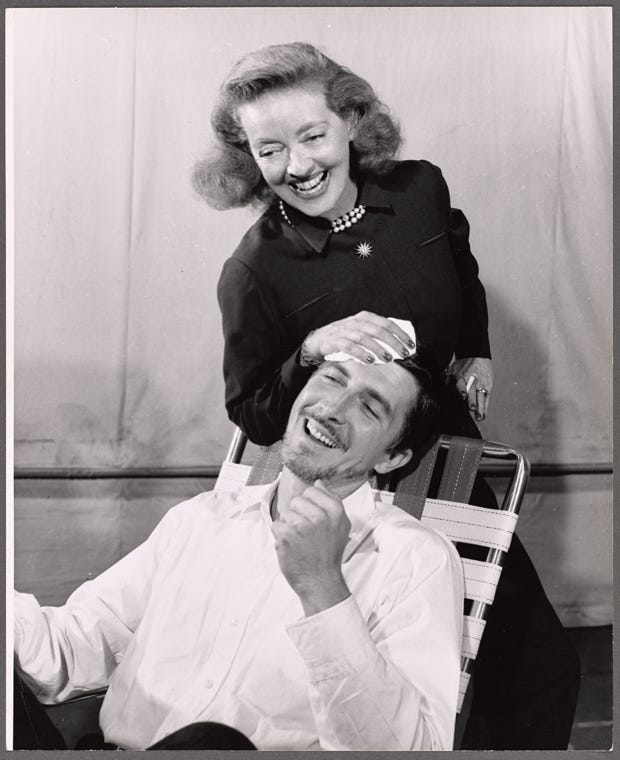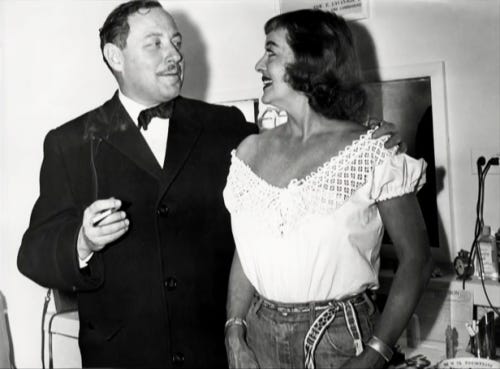Bette Davis and Tennessee Williams: Disappointment.
"If she had ever truly had a command of her talent on the stage, she had lost it by that time."--Tennessee Williams
I was introduced to Bette Davis by Marian Seldes via a telephone call. Marian explained to Davis that I had an assignment—odd, shaky, unclear—to go to various women, and a handful of men, and ask if they felt that Tennessee Williams had mattered to them, because in ways both small and large, these women had mattered to him, and they kept him moving and reaching.
Bette Davis thought it was madness. No one, she insisted, could decide if a person or a thing mattered except for…well, Bette Davis. However, Marian prevailed upon her to speak to me, and Davis acquiesced. Marian and Bette had forged a sweet, tenuous friendship during the filming of a television program in the 1950s that both women knew was inferior. (It is called “Fraction of a Second,” and you can find it on YouTube.) “We just finish it, okay?’ Bette said to Marian during rehearsals and production. At one point, a crew member called out “Will the tall girl please move…” and Davis cleaved the air with a tart response. “Her name is Marian Seldes,” she said, “and that is what you will call her.”
At the break Davis and Seldes had lunch together. Marian told Davis she was okay with crew members not knowing her name; she was grateful for the work, and the opportunity to work with an actress she revered. “Bullshit,” Davis replied. “Everyone needs to know both your name and that you’re not some piece of furniture, a part of the set, a prop to be moved around. Make everyone know you and respect you. Stop apologizing for being on this fucking set!” (I assure you that Marian’s version of these events in her memoir The Bright Lights has been considerably censored.)
Davis remembered Marian, and she would see most of her stage appearances. Always she would come backstage, and Marian confessed that these were not always good performances and rarely were they accommodating theatres. “But there she was,” Marian told me. “Enthusiastic and honest. More than once—more than four or five times—she told met that I was in something bad, or I was bad, but that I had learned something, and I would move on. ‘Work is all we have,’ she told me” When Marian completed a satisfactory draft of her memoir, she sent it to Davis for a blurb, and she got one. Davis wrote—and she believed—that the book was honest and would reveal to the reader what the theatre was really like, or should be like.
This was all I knew when I had that first conversation with Davis in 1984, and the first thing the actress let me know was that Tennessee Williams was of no help to her, to anyone, during the production of “The Night of the Iguana,” in which Davis had been cast as Maxine. “He was not often there. He was not happy with things, or so I gathered. He didn’t like the director [Frank Corsaro], and on that we agreed entirely!
“It was not a happy time, and I was terribly disappointed,” Davis continued, “Not in Tennessee Williams, who wrote a wonderful play, but in everything else. Everything else! My God, I got no help at all from anyone. I was led to believe that [Elia] Kazan might direct, and I found this terribly exciting, but he was not available or he was not interested, and I got someone totally terrified and not at all helpful. And that cast! If I got five words out of Mr. [Patrick] O'Neal or Miss [Margaret] Leighton, it was a miracle. There was no camaraderie, no sense of kinship, no attitude of pulling together to make the play work.”
Feeling stranded in New York as well as in her part, Davis called on Marian Seldes. “I don’t know why,” Marian told me. “I guess she knew I would take the call. I guess she knew that I would find time for her, even though I was working and raising a child. She knew I would be sympathetic.” Seldes went to see Davis and listened to her complaints. “I did not agree with her at all,” Seldes told me. “I just don’t think or work as she did. I do not—I cannot think of actors as competition. I think we are part of a community, and I want to believe—and I do believe—that we tend to want the best for others. Regardless of how we feel in the pursuit of work, I think we can only succeed and be good at what we do, and be good for others, if we provide a safe place in which we can make mistakes and grow and realize the part we’ve been given. I think we are lucky to work at what we love, and I’m sorry to say that Bette did not feel lucky. I think that Bette thought her career was something she fought for, made demands of, endured humiliation to achieve, and this saddened me.”
When I sent Marian my notes from that first telephone call with Davis, this is what she read:
I do believe that professionalism is dead. The working situations I find today are ludicrous! There is so much waste--of time, of talent, of money. I worked like a demon all those years: You're looking at talent and sweat when you look at my work, but today there is very little work on the parts: the work is in the deals, the contracts, the publicity, and then a vacuum shows up on the screen or the stage. I see very little that interests or impresses me these days, and this makes me very sad, because I love the theatre and I love films. I don't think I'm an angry old lady, complaining about things and feeling left out. I have a body of work and a history that I think merits attention, and I think my opinion means something, and I think the work coming out now stinks! There is no individuality in the actors or the films. Why? What happened?
This project you're on--finding Tennessee's women and talking to them is good, but it's sad. All of those women you've mentioned--there will never be a list of names like that again. Good luck to the person who dreams of a life in the theatre in another ten or twenty years. Who will they write to for help? Who will they wait in line to see? Who will they conjure in thought to create a character? It's very sad, I tell you. It's over. I really think it's over. I honestly think that we will no longer go to theatres to see films--they'll be shown entirely on televisions now: on cable or video recorders. This is horrible, I think. I think films should be seen on a big screen with an audience, and I think you should get together and get dressed and sit with that group and give a damn about what happens. I think you should go to the theatre to see great plays about great ideas, cast with people you want to look at for two hours, creating characters who are interesting and larger than life.
Marian’s response was swift: “Well, this saddens me,” she said. “Look, things are always changing in the world. The entire world. Of course, the theatre has changed. Everything has changed, but I still believe in the world, people, the theatre, films, television, publishing. My brother is an agent—he was once an editor—and he tells me all the time how that world has changed, but he doesn’t lose his faith: He still believes in writers and readers finding each other. The world will always need theatre. Perhaps I say that and believe that because I want and need the theatre, but I don’t think I’m wrong. New ways of seeing plays will come along, and there will still be good writers and actors. I tell my students to always be aware of what is changing in the ways of production and presentation, but what cannot change is their faith, their devotion to be the best they can be. Let me ask you this, my darling: Did you show Bette or tell Bette what Tennessee had said about her?”
I confessed that I had not. Davis had opened so strongly, so negatively in our phone call that I knew—I felt—that Tennessee’s words would have enraged her and ended our time together.

Here is what Tennessee Williams said about Bette Davis:
She lived both on and for struggle--she adored a challenge and felt purely alive when she was in the battle to vanquish it. And, oh, the joy when she succeeded, and for years so many people allowed her to believe that she always succeeded. She was indomitable; she was impossible; she was fabulous.
She was out of her element on [Night of the] Iguana. If she had ever truly had a command of her talent on the stage, she had lost it by that time. There was ever any doubt that she could command a sound stage, but she seemed lost working on a play; she seemed small, lost. Of course this made her terribly angry, so most of what we saw was the virago, railing about the set and the costumes and the audiences: She both wanted for them to love her and want to see her, but would then chastise them for being stupid fans who weren't there to appreciate my play. Davis also could not help perpetually thinking of her investment in the play: At Warner Bros., she would always begin, she could work for four to six weeks, and at the conclusion of that time, she would have a Jezebel or a Dark Victory or The Letter to show for it: a completed project, featuring her, ready to sell, ready for applause. On a play, you put in two, three months, and all you have is the same play, but you are, one hopes, perfecting the performances, helping your fellow players perfect their own performances. This was insufficient to Miss Davis.
She had no respect for the director [Frank Corsaro], but none of us did: He was not up to the task. Bette claimed that the Method, or rather its practitioners within the play, sabotaged her, but there was none of that: Patrick O'Neal was far too lazy a student of any acting style to have used it to such a degree as to distract, and Margaret Leighton--sublime, peerless--was simply a great actress perfectly cast. No one had time for Bette, and this drove her insane. Everyone was there to work, to perfect the play, and no one had time to see after Miss Davis.
I wanted her to be great, but she was not: She was Bette Davis, slumming in a play. To my amazement she would look out over the audience, counting the house, making no attempt to be in character unless she was speaking. I was, shall we say, disappointed. And then she left the play.
I continue to enjoy Miss Davis through her films, and through those other great performances she gives in interviews, during which she gives the impression--false, in my opinion--of a smart, decent, upright lady.
Better, in so many circumstances, to not meet people you admire.

Marian Seldes found this all terribly sad. Marian loved Bette Davis, and Marian loved Tennessee Williams, but she could not endorse or respect the way they appeared to have behaved toward each other. “I was not there,” Marian admitted, “but I have heard things. I saw the performance. I do not think they are untruthful in what they have said, but, you see, I don’t want to believe any of this, because it diminishes these wonderful people. Nothing in life should be a competition that damages another person. The competition is to be the best you can be. Tennessee and Bette mentioned Margaret Leighton, and I know that I never could have been as good as Margaret Leighton. She was a brilliant and beautiful actress. That is that. There is no degree of dedication that I might have applied to bring me anywhere near her degree of excellence. Margaret Leighton was blessed with talent and beauty. A great talent. However, she did not apply it in a way to diminish anyone with whom she was working. She did not act beautifully to make a lesser actress like me feel less effective or needed. She simply was. I think that Tennessee and Bette both felt there were people and plots around to diminish them, deny them employment, say negative things about them. Both of them would ask if I had heard anything about them. Both of these remarkable people were full of paranoia. I don’t understand it. These are great talents and so much of their time was so poorly spent. We have so little time. We are so lucky We have to dedicate our time to being fully present and ready to work at being the best people—not just the best artists—we can be. Bette knew that I was friends with Edward Albee, that I worked with him and loved him. Bette’s regret was that she did not get to play Martha in the film version of “Who’s Afraid of Virginia Woolf?” and she asked me if I thought it was some plot of Edward’s or of Jack Warner or of Mike Nichols to deny her this dream. I could never be in a position to know anything like this, and I don’t think I was the only person of whom this was asked. I think Bette asked anyone who might listen. I think Bette wanted to be the victim of some sabotage, and now she had a fight on her hands. Edward wanted Bette to be in his play “Everything in the Garden.” It was a small part, but a good one. Edward had his own fantasy: of Bette Davis coming in at the conclusion of his play as an elegant, evil madam, who had made the nice women of suburbia into prostitutes. Bette was outraged. She called me in a fit. She felt so insulted that Edward would offer her such a small part, and she thought it was another part of a campaign to humiliate her. I think she carries this with her to this day. [Marian would later say that she thought Bette Davis carried this belief to her grave. The part of the madam was ultimately played by Beatrice Straight.]
“Well, you have a lesson here, don’t you? What will you do with it? What have you learned? What will you share?
There will be more to come on how we work and how we believe in future posts.
The statements from Bette Davis and Tennessee Williams first appeared on jamesgrissom.blogspot.com on June 9, 2012.








